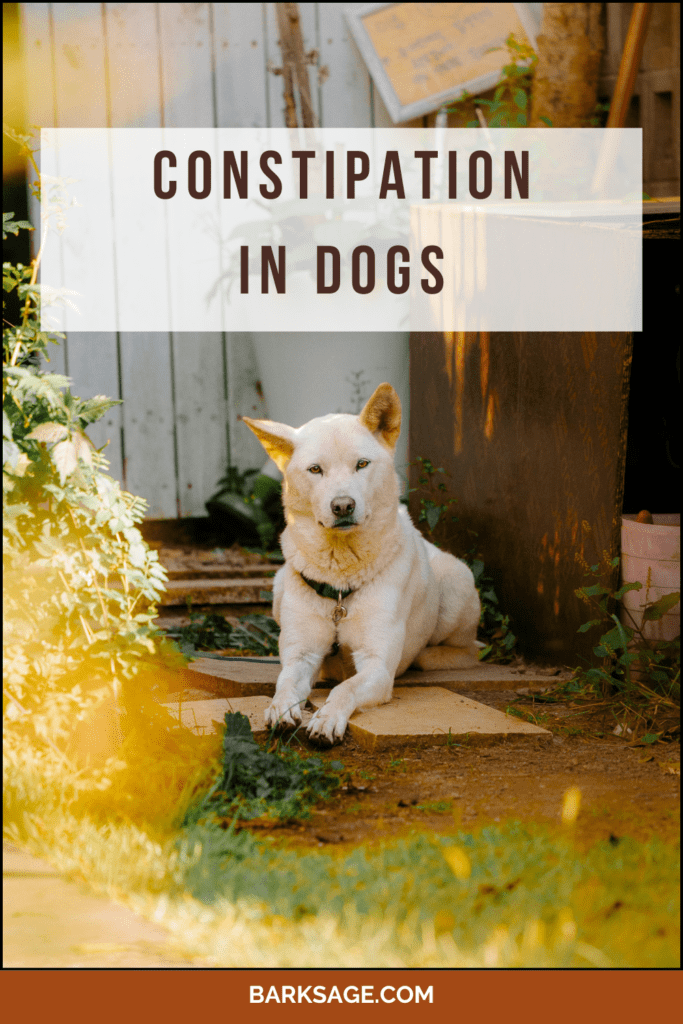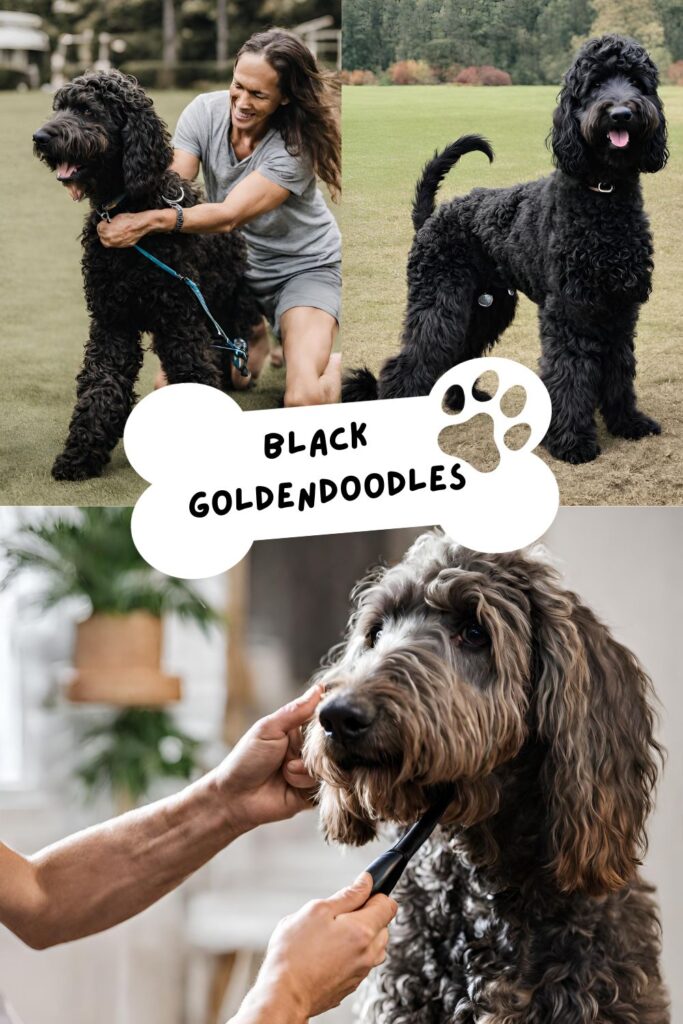
Have you ever noticed your furry friend experiencing constipation? Are you aware of the causes and effective remedies to provide them relief? In this article, we will delve into the world of constipation in dogs, exploring the key causes and remedies that can help maintain their digestive health. Whether you are seeking core care, patient information, internal medicine, or emergency care for your canine companion, we have got you covered. Join us as we unravel the secrets to keeping your dog happy and comfortable.

A distressed dog struggling to poop while standing on a grassy lawn with a visible stool behind them. The dog’s face is scrunched up in discomfort and their tail is lowered. In the background, there are trees and a blue sky with clouds.
Key Takeaways:
- Understanding the causes of constipation in dogs is essential for their overall well-being.
- Routine exams and monitoring bowel movements can help prevent and manage constipation.
- Enlarged prostate gland in male dogs and other underlying factors can contribute to constipation.
- Proper diet and fiber intake play a crucial role in maintaining a healthy digestive system.
- Consulting veterinary specialists and avoiding human medications are vital for your dog’s health.
Understanding Constipation in Dogs
In this section, we will provide you with a comprehensive understanding of constipation in dogs. It’s important to be aware of the signs and symptoms of constipation, as well as the underlying causes and effective management strategies. By gaining this knowledge, you’ll be better equipped to provide the necessary care and support for your beloved canine companion.
The Importance of Routine Exams
Regular veterinary check-ups are crucial for monitoring your dog’s overall health, including their bowel movement. Routine exams can help detect any early signs of constipation and enable prompt intervention. These exams provide an opportunity to discuss any concerns with your veterinarian and receive valuable guidance on maintaining your dog’s digestive well-being.
During routine exams, veterinarians may perform physical evaluations, conduct blood tests, or recommend diagnostic imaging to assess the gastrointestinal system. By identifying potential issues early on, you can take proactive steps to prevent constipation in your dog.
Signs and Symptoms of Constipation
Recognizing the signs and symptoms of constipation is essential for prompt intervention. Some common indicators include:
- Abnormal stool consistency, such as dry and hard
- Infrequent bowel movements
- Straining or difficulty during defecation
- Pain or discomfort
It’s important to note that constipation may be caused by various factors, each requiring specific attention. By carefully observing your dog’s behavior and stool, you can provide valuable information to your veterinarian, aiding in the accurate diagnosis and effective treatment of constipation.
Specific Factors Contributing to Constipation
Several factors may contribute to constipation in dogs. One notable factor is the enlarged prostate gland, which commonly affects male dogs. The swelling of the prostate gland can obstruct the rectum, leading to difficulty in passing stool. If you notice any signs of constipation in your male dog, seeking guidance from veterinary specialists is crucial for accurate diagnosis and appropriate treatment.
Additionally, the size and breed of your dog can influence the likelihood of constipation. Large breeds, such as Great Danes or Mastiffs, are more susceptible to constipation due to their sizeable intestinal tract and slower movement of feces. Understanding these breed-specific characteristics can help you tailor your approach in managing constipation and seeking necessary medical advice.
Managing Constipation in Dogs
When it comes to managing constipation in dogs, the underlying cause must be identified and addressed. Your veterinarian may recommend specific treatments or adjustments to your dog’s diet to alleviate constipation symptoms. It’s vital to follow their guidance and monitor your dog’s response to treatment.
In some cases, a fiber-rich diet with increased water intake can help regulate bowel movements and soften the stool. Your veterinarian may also suggest the use of stool softeners or prescribed medications to promote regularity. However, it’s crucial to avoid administering human medications without veterinary advice, as some can be harmful to dogs.
Remember, every dog is unique, and the management of constipation may vary based on individual needs. Consulting veterinary specialists and following their expert advice is essential to ensure the well-being of your constipated dog.
Remedies for Constipated Dogs
In this section, we will discuss various remedies to alleviate constipation in dogs. We understand that maintaining your dog’s digestive health is essential, and we will provide you with valuable information to help your furry friend find relief.
The Importance of a Balanced Diet
A proper diet plays a critical role in your dog’s overall health, including their digestive system. Ensuring your dog’s diet includes an adequate amount of fiber can promote regular bowel movements and prevent constipation. Including high-fiber foods such as vegetables, fruits, and whole grains in their meals can help maintain a healthy intestinal tract. Additionally, providing your dog with fresh water throughout the day is crucial in preventing dehydration, which can contribute to constipation.
Addressing Neurological Disorders and Stool Softeners
Some dogs may experience constipation as a result of underlying neurological disorders. If you suspect this may be the case, it is important to consult with your veterinarian for proper diagnosis and treatment. In some cases, they may recommend safe stool softeners to help relieve constipation and promote regular bowel movements while considering your dog’s overall health.
Managing Mild Constipation and Dealing with Matted Hair
If your dog experiences mild constipation, there are a few remedies you can try at home. Gently massaging their abdomen can help stimulate bowel movements and alleviate discomfort. Additionally, regular grooming to prevent matted hair around the anus can help avoid blockages and promote regular elimination.
Benefits of Wellness Plans and Prescription Diets
For dogs with chronic constipation or underlying health conditions, wellness plans and prescription diets tailored to their specific needs can be beneficial. These plans and diets are designed to support digestive health and provide the necessary nutrients for optimal bowel function. Your veterinarian can guide you in choosing the right plan or diet for your constipated dog.
Potential Dangers and Orthopedic Issues
It is crucial to be mindful of potential dangers that dogs may encounter, such as ingested pieces of toys or other objects. Ingesting foreign objects can lead to blockages and contribute to constipation. Additionally, orthopedic issues in dogs, such as arthritis, can make it challenging for them to assume the proper position for bowel movements. Consult with your veterinarian for advice on managing these issues and promoting regular elimination.
Recognizing Dog Constipation Symptoms and Incorporating Fiber
Being able to recognize the signs of constipation in dogs is vital. Look out for symptoms such as straining, infrequent bowel movements, or the production of dry, hard, or small stools. If your dog displays these symptoms, it is important to take action promptly to prevent further discomfort and complications.
Incorporating fiber into your dog’s diet can help promote regular bowel movements. However, it is important to introduce fiber gradually and monitor your dog’s response. Too much fiber can have the opposite effect and lead to loose stools or diarrhea. Consult with your veterinarian for guidance on the appropriate amount and sources of fiber for your constipated dog.
Avoiding Human Medications and Small Animal Cookies
When your dog is experiencing constipation, it can be tempting to reach for human medications as a quick remedy. However, it is crucial to avoid giving them any medications without the guidance of a veterinarian. Human medications may have different effects or dosages for dogs and can pose serious risks to their health.
Instead, consider specialized small animal cookies that are specifically formulated to support digestive health. These treats can provide additional fiber and nutrients that aid in maintaining regular bowel movements. Always choose reputable brands that prioritize your dog’s well-being and consult your veterinarian for recommendations.
By incorporating these remedies and taking a proactive approach to your dog’s digestive health, you can help alleviate constipation and ensure their overall well-being.
| Remedy | Description |
|---|---|
| Balanced Diet | Including fiber-rich foods in your dog’s diet to promote regular bowel movements. |
| Neurological Disorders and Stool Softeners | Consulting with your veterinarian to address underlying neurological disorders and using safe stool softeners if necessary. |
| Mild Constipation and Matted Hair | Managing mild constipation through gentle massage and preventing matted hair around the anus. |
| Wellness Plans and Prescription Diets | Opting for wellness plans and prescription diets tailored to your dog’s specific needs. |
| Potential Dangers and Orthopedic Issues | Being cautious of ingested pieces and managing orthopedic issues that can contribute to constipation. |
| Recognizing Symptoms and Incorporating Fiber | Knowing the signs of constipation and incorporating fiber into your dog’s diet with guidance from your veterinarian. |
| Avoiding Human Medications and Small Animal Cookies | Avoiding the use of human medications and considering specialized small animal cookies for digestive health. |

Create an image of a frustrated dog with an uncomfortable expression, sitting with its hind legs together and tail drooping, while surrounded by images of common causes for constipation in dogs (such as too little exercise, dehydration, and a diet lacking in fiber).
Conclusion
Throughout this article, we have delved into the causes and remedies for constipation in dogs. By understanding the signs of constipation and addressing underlying issues, you can play a crucial role in maintaining your furry companion’s healthy digestive system.
When it comes to constipation, it is important to remember that severe or prolonged cases require professional veterinary care. Consulting a veterinarian will ensure your dog receives the appropriate treatment and alleviation from discomfort.
By providing proper care and attention to your dog’s diet and overall health, you can contribute to their happiness and comfort. Make sure to prioritize a balanced diet, including fiber-rich foods, and be mindful of any underlying medical conditions that may contribute to constipation.
With your dedicated care, your beloved canine can lead a vibrant and fulfilling life, free from the inconvenience of constipation. Remember to monitor their bowel movements, seek professional guidance when needed, and make their well-being a top priority.


